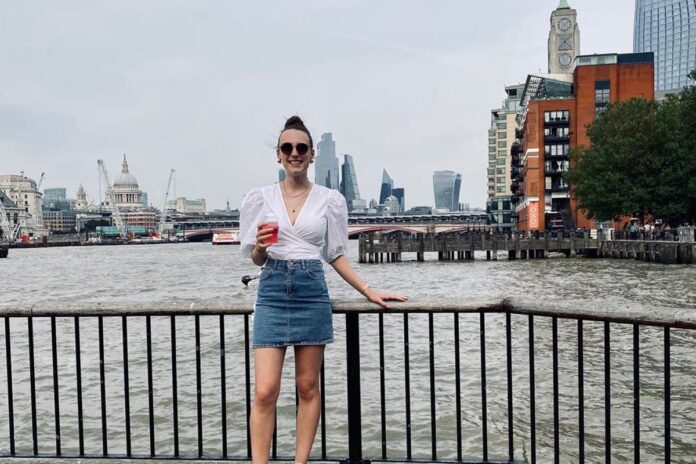A thrifty young woman started shopping exclusively for second-hand clothes after learning the Earth has enough garments to clothe the next six generations.Iso Neville, 25, from Herne Hill in London, swapped to 100 per cent secondhand clothes to save money and the environment back in 2019, finding her fashions on secondhand apps, in charity shops and at car boot sales.With browsing secondhand apps replacing her nightly social media scrolls, Iso has bagged blazers worth £2,000 for just £40 and designer dresses for free – saving thousands on her shopping spend while also getting an exhilarating high from her finds.Now the content and social media manager reckons the cost-of-living crisis and aftermath of the pandemic have created a perfect thrifting environment – with sellers keen to get rid of unwanted clothes they splurged on during the pandemic and buyers wanting to stay fashionable but save money.’My priorities at the moment are to buy food, pay my rent and have enough left over to heat my home,’ Iso said.’I think the cost-of-living crisis has helped the availability of secondhand items. Selling your clothes is a really easy way to make more money.’She added: ‘It’s good for the environment and good for your pocket.’Remembering why she decided three years ago to buy only pre-loved clothes, Iso said: ‘I was already buying a lot of things secondhand, but when I heard a shocking statistic – that we have enough clothes on earth right now to clothe the next six generations – that made me want to cut out new clothes for good.’Sustainability is very important to me and there are very good quality clothes secondhand, which outlive your average clothes in a fast fashion shop.’And the pandemic has helped her find bargains.’A lot of what’s coming out is often clothes that people potentially bought during the pandemic to cheer themselves up,’ Iso explained.’Now everyone’s cleaning out their wardrobes and finding all these things that they’ve never got around to wearing.’She added: ‘So the quality of items that you can get secondhand is also potentially better than ever because people are rediscovering these things and wanting to give them a better home.’The cost-of-living crisis has helped Iso too.She said: ‘There’s more availability of great pieces whereas before, people might not have had that monetary incentive to sell their clothes.’She added: ‘My friends and I are all selling clothes online to save money and I’ve noticed the availability of secondhand items is better than ever before.’Retailers are experimenting with secondhand as well. Dr Martens for example have a DePop Shop, on the online market forum, where they resale refurbished shoes.’So you know that it’s authentic but you’re still getting it for cheaper.’Over the last few months Iso has garnered £4,141 worth of clothes for just £200, including an Yves St Laurent blazer, retailed at over £2,000, for just £40.’I would never pay full price for that blazer – for one I couldn’t afford it,’ said Iso.’It’s one of my favourite finds. Recently I went on holiday to the Lake District and I got a pair of Object leather trousers, brand new with tags for £10.’She added: ‘The tag said they were £180 new, it feels so good when you find a bargain.’Another one of my favourites is a Reiss two-piece waistcoat suit new with tags on that I found at at a car boot sale in Peckham for £20 – it was immaculate.’I went home, and the suit was still on the Reiss website for £306. The girl I was buying from was a stylist and she was just getting rid of so many amazing clothes.’The thrifty shopper also bagged two Ganni dresses, worth around £200 each for free, thanks to a clothes swap organised with her friends.’We all just went to one of our houses and brought stuff we were going to list online or give to charity shops – we gave each other first dibs,’ she said.’Everything that we didn’t swap went to charity after that, but it was such a great way to have fun without spending money.’She added: ‘I feel like a proud mum when I see my friends wearing one of my items from the swap. It’s really nice.’Iso tries to fund all her secondhand clothes purchases by selling items she no longer wants, creating her own pre-loved cycle.She said: ‘If I sell something on an app like Vinted, I keep the money on the app – instead of transferring it to my bank account.’She added: ‘I try to not pay for any secondhand clothes online, instead I just use the credit in the app. So it’s a kind of a constant cycle.’I’m not really spending any money, I’m just reusing the money.’And Iso is hopeful the current cost-of-living crisis might create a more sustainable attitude to clothes in the long term.’It just feels much better shopping secondhand,’ she said.’When you go into a charity shop or look at pre-worn clothes online it’s more exciting than going into a shop or buying new, it’s a bit more fun – we could easily all shop secondhand.’And Iso, who is 5ft 8in and a size eight, said no matter what your body shape is there are bargains out there to snap up.’There really are enough clothes out there from your favourite brands in your size,’ she reassured.’I would never buy these items full price.’
Thrifty shopper reveals shocking statistic that stopped her buying new clothes
Sourceindependent.co.uk
RELATED ARTICLES


